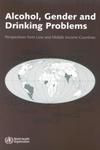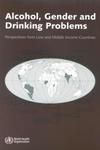Alcohol, Gender and Drinking Problems
This book is the product of a multinational research project on "Gender, Alcohol and Culture: an International Study" (GENACIS), a major collaborative effort to highlight the relationship between gender and alcohol issues.

GENACIS is a major collaborative effort to highlight the relationship between gender and alcohol issues, seek greater understanding of male and female differences in patterns of drinking and alcohol problems, and assess the public health implications of drinking by men and women.
Each of the eight country-specific chapters in this volume consists of a review of alcohol and alcohol policy in the country and an analysis of social and health problems associated with drinking. For several of the countries, this is the first systematic attempt to provide a broad insight into gender issues and how they relate to alcohol problems. I
n an era of growing consumption and increasing burden of alcohol-related problems in many developing countries, the findings reported in this book and the GENACIS project in general, are a major step forward in our understanding of the role of gender in alcohol behaviours.
Obot, I.S., Room, R.: Alcohol, Gender and Drinking Problems; Perspectives from Low and Middle Income Countries, Nonserial Publication, World Health Organization, 2005
You can download the pdf version of the book here.
The book can also be ordered here from the WHO online bookshop.
RELATED ARTICLES
- WHO consultation on global alcohol strategy and the way forward
- SAAPA applauds WHO position on no industry collaboration
- SAFER – a new WHO initiative to boost national alcohol policy processes
- UN High-Level Meeting on NCDs misses the target
- WHO Launches Global status report on alcohol and health 2018
- Bolder actions needed to reverse the tide of NCDs and mental disorders
- Public health advocates urge Global Fund to end Heineken partnership
- New resource tool on alcohol taxation from WHO
- Intervention gives reduced drinking, aggression and violence
- Alcohol brought up in WHA NCD debate

